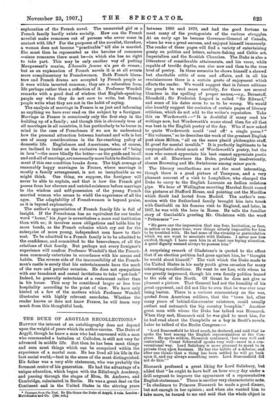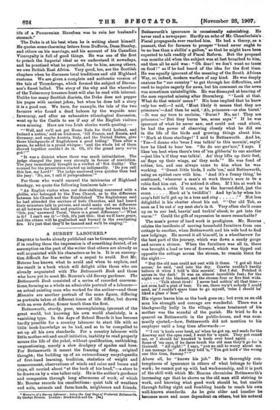THE DUKE OF ARGYLL'S RECOLLECTIONS.* HAPPILY the interest of an
autobiography does not depend upon the weight of years which its author carries. The Duke of Argyll, though he knew a man who had conversed with a man who commanded a battalion at Culloden, is still not very far advanced in middle life. But then he has been most things and seen most things which can be comprised within the experience of a mortal man. He has lived all his life in the best social world,—best in the sense of the most distinguished. His father was a very able statesman, who was probably the foremost orator of his generation. He had the advantage of a unique education, which began with the Edinburgh Academy, and passing through the stages of Eton, St. Andrews, and Cambridge, culminated in Berlin. He was a great deal on the Continent and in the United States in the stirring years * Passages from the Past. By His Grace the Dole of Aran. 2 vols. London : Nutolansoa and Co. [2ils. net.]
between 1860 and 1870, and had the good fortune to meet many of the protagonists of the various struggles. At an. early age he became Governor-General of Canada, where he was a great success, and enjoyed himself immensely.
The reader of these pages will find a variety of entertaining gossip on. politics and letters, salmon-fishing and Celtic art, Imperialism and the Scottish Churches. The Duke is also a litterateur of considerable attainments, and his verse, while capable of terrific depths, can rise now and then to the true level of poetry. In these memoirs he shows himself a shrewd but charitable critic of men and affairs, and in all his reminiscences there is a certain gusto of enjoyment which affects the reader. We would suggest that in future editions the proofs be read more carefully, for there are several blunders in the spelling of proper. names,—e.g., Bernstoff, Blomfield ; Sir Frederick Lugard is called " Sir Edward," and some of his dates seem to us to be wrong. We would also humbly suggest the omission of certain pages of literary criticism, which do not add to the writer's reputation. Take this on Wordsworth It is doubtful if many read his writings now, but Wordsworth's name stood then for all that was best in the English poetry of the day. Who if now asked to quote Wordsworth could reel off' a single poem P " " Six volumes," so he describes the work of the greatest English poet since Milton, " all on the same placid philosophic stuff, fit gruel for mental invalids." It is perfectly legitimate to be unsympathetic about much of Wordsworth's poetry, but the man who cannot appreciate his best cannot appreciate poetic art at all. Elsewhere the Duke, probably inadvertently, classes Browning and Mr. Swinburne among minor poets.
The literary recollections are not the most interesting, though there is a good picture of Tennyson, and a very pleasant account of a visit to Longfellow, who charged the Duke to carry to the English Laureate an Indian redstone pipe. We hear of Wellington escorting Marshal Soult round the pictures at Stafford House, and pointing out the Murillo' which Soult had looted from Madrid. The author's con- nexion with the Sutherland family brought him into touch with Garibaldi on his famous visit to England, and later, in 1867, he was with the hero in Rome. He tells the familiar story of Garibaldi's greeting Mr. Gladstone with the word " Precurseur " :—
"He gave one the impression that any fear, hesitation, or fuss, in action or in peace time, were things utterly impossible for him to be troubled with. He had none of the vivacity or gesticulation which we are wont to associate with Italians. I never saw him excited, though I have seen him in at least one trying situation. A quiet dignity seemed always to possess him."
A surprising remark of Gladstone's is quoted to the effect that if an election petition had gone against him, he " thought he would shoot himself." The visit which the Duke made to the United States in his early youth gives occasion for many interesting recollections. He went to see Lee, with whom he was greatly impressed, though his own family politics leaned to the side of the North. Of Grant he does not give so pleasant a picture. That General had not the humility of his great opponent, and did not like to own that he was ever near being beaten. There is a curious commentary on the war, quoted from American soldiers, that the " town lad, after many years of behind-the-counter existence, could usually outlast and outmarch the big country bumpkin." Another great man with whom the Duke has talked was Bismarck. When they met, Bismarck said he was glad to meet him, for he had read about the Campbells as a boy in Scott's novels. Later he talked of the Berlin Congress :—
" Lord Beaconsfield he liked much, he declared, and said that he spoke the best among the English representatives at the Con- gress. He spoke seldom, Bismarck continued, ' but very well and oratorically. Count Schuvaloff speaks very well—more in a con- versational way. Lord Salisbury is more pleasant to speak to in private than upon business. He has the habits of a debater, and after one thinks that a thing has been settled he will go back upon it, and say always something more. Lord Beaconsfield did not do this: " Bismarck professed a great liking for Lord Salisbury, but added that "he ought to have half an hour every day under a
drill sergeant to improve the appearance of a representative English statesman." There is another very characteristic note. " In obedience to Princess Bismarck he made a good dinner, but not enough in her opinion.; and when she wanted him to take more, he turned to me and said that the whole object in
life of a Pomeranian Hausfran was to ruin her husband's
stomach."
The Duke is at his best when he is writing about himself.
He quotes some charming letters from Dufferin, Dean Stanley, and others on his marriage, and his account of his Canadian Viceroyalty is full of good things. He was one of the first to preach the Imperial ideal as we understand it nowadays, and he practised what he preached, for to him, among others, we owe British East Africa. Very good, too, are the Scottish chapters when he discusses local traditions and old Highland customs. We are given a complete and authentic version of the tale of Ticonderoga, which formed the subject of Steven- son's finest ballad. The story of the why and the wherefore of the Tobermory treasure-hunt will also be read with interest.
Unlike too many Scottish diarists, the Duke does not pepper his pages with ancient jokes; but when he does tell a story it is a good one. We have, for example, the tale of the two farmers who found a dead baboon by the wayside near Inveraray, and after an exhaustive ethnological discussion,
went up to the Castle to see if any of the English visitors were missing. Here are two Irish stories worth quoting :— "' Well, and we'll not get Home Rule for Ould Ireland, and Ireland a nation,' said an Irishman, 't•ill France, and Russia, and Germany, and maybe Austria, Italy, and the United States, give those blackguards of Englishmen a good hiding.' Then after a pause, he added in a proud whisper: and the whole lot of them shoved together couldn't do it. Oh, it's the grand navy we've got !"
"It was a district where there was much intimidation. The judge charged the jury very strongly in favour of conviction. The jury immediately brought in a verdict of ' Not Guilty.' The counsel for the prosecution started up indignantly. Do you call this law, my Lord?' The judge answered even quicker than had the jury : `No, sor, I call it jurisprudence.'"
For those who would unravel the intricacies of Highland theology, we quote the following luminous tale :— "An English visitor when out deer-stalking conversed with a ghillie, who belonged to the Free Church, as to the difference between his Church and the Established The Englishman said he had attended the services of both Churches, and had beard their ministers talk in private, and could make out no difference at all between the faith and practice of worship between the two. 'Och, yes,' answered Tonal, 'there is a great difference.'—' What is it? I can't see it.'—'Och, it's just this: that welt have grace, and the others will be gralloched and burned in the everlasting fire. It's just that they'll be tamned and we'll be singing.'"



















































 Previous page
Previous page